The City has not taken kindly to Hotel Chocolat’s latest update. Since announcing plans to “de-risk” the business this morning, the group’s shares have plummeted to their all-time lowest level.
What “de-risking” means, in this case, is seemingly abandoning its trumpeted global growth strategy. The chocolatier will shutter its US retail stores and scale back investment in both the US and its Japanese joint venture to concentrate on its home market.
The international rollback means it will incur one-off charges – £3m for the US store closures and writing off £23m of loans to the Japanese business – that will result in an annual loss in 2023.
Its 2023 profits and sales growth will not only be hit by the scaleback of its international operations, but a potential spending slowdown in the UK due to the cost of living crisis.
So, despite better than expected core UK trading figures in the year to 26 June, the City was spooked. The result was a 45% share price plunge to 128.3p – lower than its 2016 float price of 148p, and down from 540p in just October last year.
The share price reflects the scaling down of potential for Hotel Chocolat, as it seemingly retreats back into the UK market. Peel Hunt analysts said the plans “come as a surprise to many, and a disappointment, as these were obviously the first real steps to demonstrate that [Hotel Chocolat] was able to become a global brand”.
But in many ways, Hotel Chocolat had an almost impossible task on its hands – in the US, at least. It suffered from scaling up its retail operations in the market just before Covid took hold, leading to shuttered shops and severely reduced footfall.
And Hotel Chocolat is far from the first UK food and drink business to have trouble cracking the US, even in the best of times. Tesco’s Fresh & Easy stores failed, Greencore sold off its problematic US sandwich unit and even previous US success Fever-Tree outlined sales problems in the market this week amid supply and labour issues.
Amid the negativity around its US and Japan exit, CEO Angus Thirlwell insists the brand’s global goals remain unchanged, and says today’s announcement does not represent any scaling back of ambition.
Instead the business has committed to a different way of going about it without burning through cash – a “de-risking” to prioritise core areas in which return on investment is reliably strong.
The recent collapses of tech-focused consumer stocks – such as Deliveroo, Ocado and THG – have been illustrative of a greater investor focus on cash generation and bottom lines. No longer are investors prepared to shovel cash into businesses buying growth through losing money.
Instead, Hotel Chocolat is reading the tea-leaves – or the chocolate flakes in this case – on the direction of the global economy, and deciding now is the time to tighten its belt and focus on its core business, rather than more speculative (and currently unprofitable) growth opportunities.
To illustrate the changed environment, its release this morning highlighted 900 bps of cost headwinds on the horizon, from investment in brand and sustainability, investment in production and external inflation.
House broker Liberum, going in to bat for the beleaguered stock, insisted that after the “transitory” period of 2023 and the absorption of some “short-term pain”, the bigger picture remains positive. In a note titled ‘One step back to move three steps forward’, the broker argues: “Considering the backdrop, the group are making the prudent decisions to drive profitability and cash by making less risky decisions.”
The prize for patient investors will be EBITDA margins of 20%, which would be £56m off revenues of around £280m. “Previous peak EBITDA margins were 18.3% in 2018 but with significantly greater scale should be imminently achievable,” Liberum writes.
Certainly there remains a lot to like about Hotel Chocolat’s UK business.
UK sales are 68% up on-pre-pandemic levels and 35% up year on year, with retail in growth amid improved profitability and a significantly larger online business, which has held on to and built on pandemic gains.
This scaling back of international investment also reflects a “significantly larger addressable market size than previously estimated” – meaning this is not about profitable sales decline.
It has invested significantly in production, with UK factory capacity increased from 210 million pieces in 2019 to 380 million pieces for 2023, and the long-term ability to grow site output to one billion pieces with further staged capex spend.
Its Velvetiser hot chocolate system (and Velvetised chocolate cream alcohol) also have “significant further UK market headroom” and will continue as capex-light growth categories.
With profits guided down for 2023 and investors asked to wait until 2024 and 2025 before improvement, it’s not surprising there has been a negative reaction to today’s announcement.
Investors are being asked to be more patient. But that patience will pay off, according to Thirlwell, who insists the brand retains ambitions to become “a true global power brand”.
The vast progress made since Hotel Chocolat’s 2016 listing suggests there is some justification for believing it is a temporary setback, rather than a more permanent downfall.







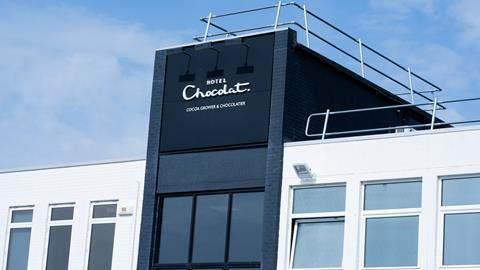
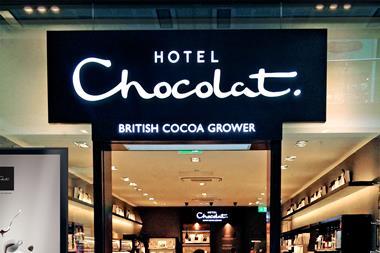
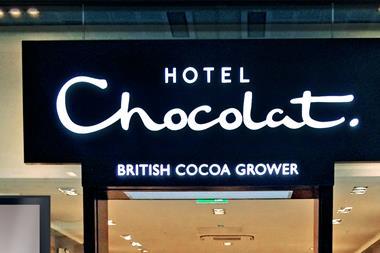
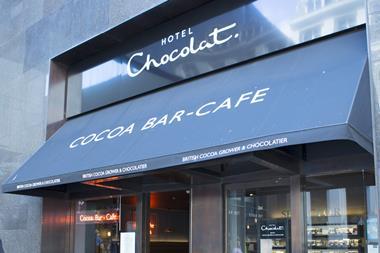
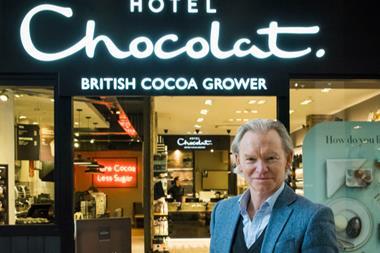
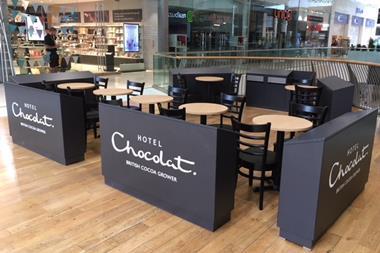
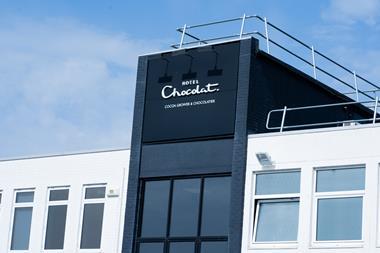






No comments yet